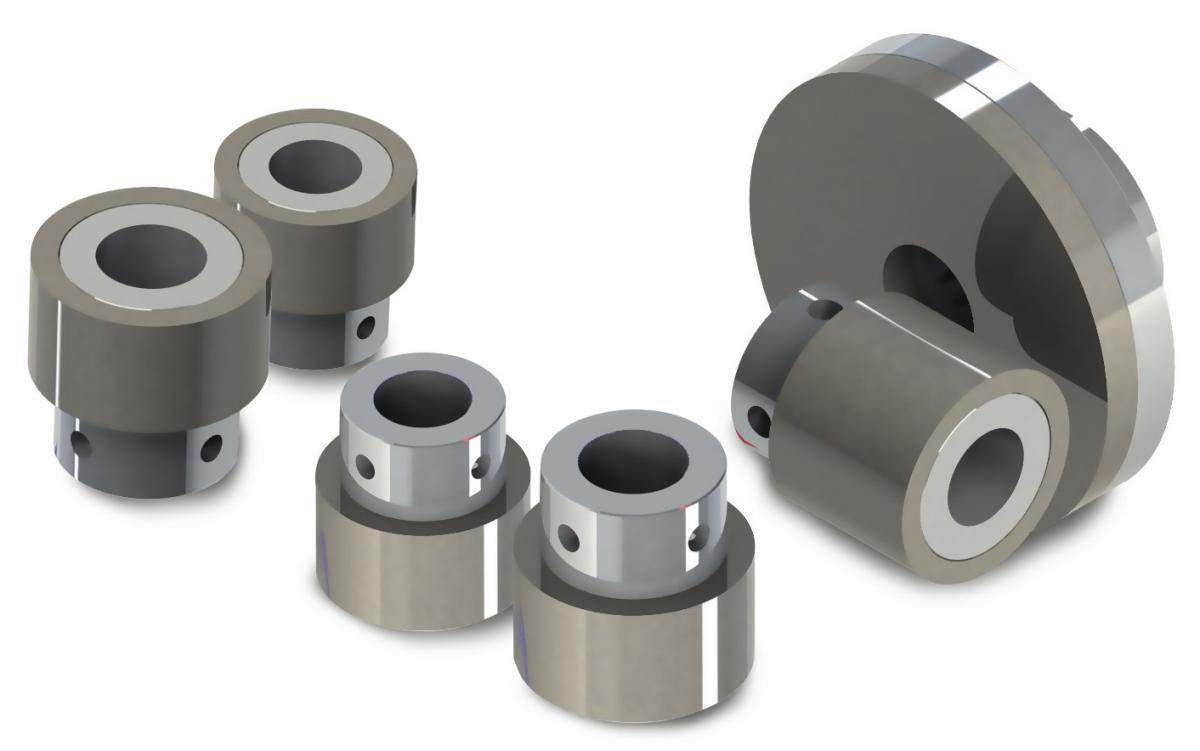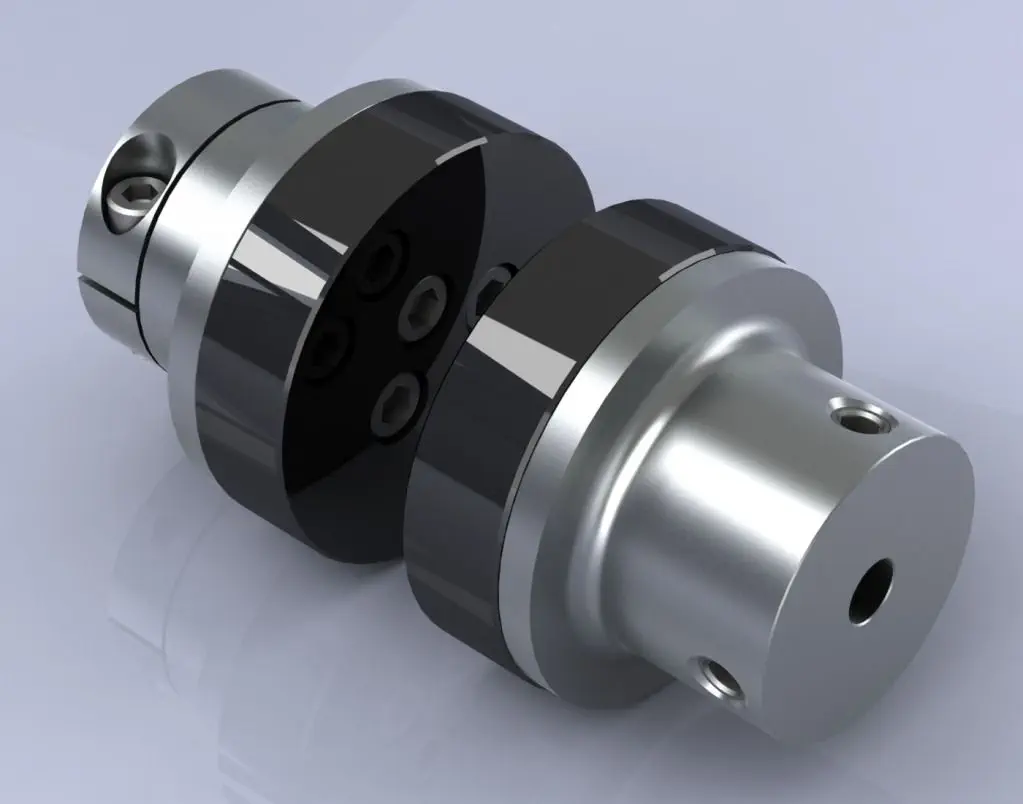Product Description
Product Description
Product Description
Magnetic coupling is a coupling that transfers torque from 1 shaft, but using a magnetic field rather than a physical mechanical connection.
Magnetic couplings are most often used for liquid pumps and propeller systems, since a static, physical barrier can be placed between the 2 shafts to separate the fluid from the motor operating in air. Magnetic couplings preclude the use of shaft seals, which eventually wear out and fail from the sliding of 2 surfaces against each another. Magnetic couplings are also used for ease of maintenance on systems that typically require precision alignment, when physical shaft couplings are used, since they allow a greater off axis error between the motor and driven shaft.
Company Profile
Company profile
ZheJiang Lulang New Material Technology Co., Ltd headquartered in HangZhou, China, is a high-tech enterprise engaged in the research, development, production and sales of new permanent magnetic materials. As an expert in the application technology of permanent magnetic materials, we have advanced magnetic performance analyzer, professional analytical magnets and experienced senior technical engineers, which can help customers better choose appropriate magnetic materials, and can also customize various magnetic components according to customers’ needs.
Our products and services: Sintered neodymium iron boron series, pressure plastic rubber magnet, high temperature resistant samarium cobalt, sintered ferrite permanent magnet, magnetic components related accessories and mold design and manufacturing; The design, testing and verification of magnetic materials, professional research and development team, meet the customer’s product customization, quality assurance, and a complete range of electroplating supporting equipment (white zinc, color zinc, white nickel, black nickel, organic epoxy resin, electrophoresis, aluminum electroplating, phosphating, etc. )
Exhibition
Exhibition
Payment and logistics
Payment and logistics
FAQ
FAQ
Q1: How long does NdFeB magnet last?
A: Under normal circumstance,magnetic force would not reduce,belong to permanent;high temperature and high pressure will affect magnet performance .
Q2: What are the surface treatments for NdFeB magnets?
A: In general, it is nickel , Zinc and black epoxy plated, we can also customize according to customer needs.
Q3: Could I get samples?How long is the delivery time for samples and bulk order?
A:1.Yes, we have materials in stock to help you to get the samples as soon as we can. 2. If we have materials in our stock, we can send them within 3 working days. If we don’t have material in stock, production timefor sample is 5-10 days, 15-25 days for bulk order.
Q4: How is the quality and price?
A: Our main markets are North America and Europe,Our core competitiveness is high quality, we will provide the high quality magnet with reasonable price.
Q5: What is the magnets application ?
A: Neodymium magnet have been growing rapidly in the global market, magnets are widely used in the :Computers, Copiers, Wind power stations, Electron spin resonance, dental material.industrial robots, Recycling,Television,speakers, Motor, Sensors. Mobile, Cars, information technologies, etc. Motors, Medical Equipment and so on.
/* January 22, 2571 19:08:37 */!function(){function s(e,r){var a,o={};try{e&&e.split(“,”).forEach(function(e,t){e&&(a=e.match(/(.*?):(.*)$/))&&1

Maintenance Requirements for Magnetic Couplings to Ensure Long-Term Performance
Magnetic couplings are designed to be low-maintenance compared to traditional mechanical couplings. However, some maintenance practices can help ensure their long-term performance and reliability. Here are the key maintenance requirements for magnetic couplings:
- Regular Inspection:
Perform regular visual inspections of the magnetic coupling to check for signs of wear, damage, or misalignment. Look for any unusual noises or vibrations during operation, which may indicate a potential issue that requires attention.
- Cleanliness:
Keep the magnetic coupling and surrounding area clean and free from dirt, debris, or contaminants. Foreign particles on the coupling’s surface can affect its magnetic performance and lead to energy losses.
- Lubrication:
Magnetic couplings do not require traditional lubrication since they operate without physical contact. However, some couplings may have bearings or other components that require lubrication. Refer to the manufacturer’s guidelines for specific lubrication requirements.
- Environmental Considerations:
Ensure that the operating environment of the magnetic coupling is within the specified limits provided by the manufacturer. Extreme temperatures, aggressive chemicals, or other harsh conditions can affect the performance and longevity of the coupling.
- Alignment Check:
Periodically check the alignment of the driving and driven shafts. Although magnetic couplings can tolerate some misalignment, ensuring proper alignment will optimize efficiency and reduce stress on the coupling components.
- Torque and Speed Limits:
Adhere to the specified torque and speed limits for the magnetic coupling based on the application requirements. Operating the coupling beyond its rated capacity can lead to premature failure.
- Overload Protection:
If the application involves occasional overloads, consider incorporating overload protection features, such as torque limiters or slip mechanisms, to prevent damage to the coupling and connected equipment.
- Regular Maintenance Schedule:
Establish a regular maintenance schedule based on the manufacturer’s recommendations. Periodic inspections, cleaning, and other maintenance tasks can help identify and address potential issues before they escalate.
- Expert Support:
When in doubt or if encountering any significant issues, seek assistance from the magnetic coupling manufacturer or a qualified engineer. They can provide guidance on maintenance best practices and address any specific concerns related to the coupling’s performance.
By following these maintenance requirements, you can ensure the long-term performance, reliability, and efficiency of the magnetic coupling in your application.

Where Can I Find Reputable Suppliers or Manufacturers of Magnetic Couplings for Specific Engineering Needs?
When searching for reputable suppliers or manufacturers of magnetic couplings, it is essential to consider several factors to meet your specific engineering needs. Here are some valuable resources and steps to help you find reliable suppliers:
- Online Directories:
Online directories, such as ThomasNet, Alibaba, and GlobalSpec, are valuable platforms to search for manufacturers and suppliers of magnetic couplings. These directories provide detailed information about companies, their products, and their capabilities, making it easier to identify potential suppliers.
- Trade Shows and Conferences:
Attending trade shows and engineering conferences related to your industry can be an excellent way to meet and connect with magnetic coupling manufacturers in person. These events provide an opportunity to see product demonstrations, discuss your specific needs, and establish direct contacts with suppliers.
- Industry Associations:
Industry associations and organizations often have a network of members, including suppliers and manufacturers of various engineering components. They may provide valuable recommendations and insights on reputable suppliers of magnetic couplings within your industry.
- Referrals and Recommendations:
Seeking referrals from colleagues or industry professionals who have experience with magnetic couplings can be valuable. Recommendations from trusted sources can save time and help you find reliable suppliers.
- Online Research:
Performing online research and reading customer reviews and testimonials can give you insights into the reputation and reliability of different magnetic coupling suppliers. Look for manufacturers with positive feedback and a track record of delivering quality products.
- Supplier Websites:
Visit the websites of potential magnetic coupling suppliers to learn more about their products, services, and manufacturing capabilities. Look for suppliers with a comprehensive product range, engineering expertise, and a commitment to meeting specific customer requirements.
- Customization Options:
Consider suppliers who offer customization options to meet your specific engineering needs. Magnetic couplings may need to be tailored for particular torque, speed, or environmental requirements, so selecting a manufacturer with the ability to create bespoke solutions is essential.
It is crucial to establish clear communication with potential suppliers, sharing your engineering specifications and expectations. Requesting samples or prototypes, if possible, can also help evaluate the suitability of the magnetic couplings for your specific applications. Ultimately, choosing a reputable and experienced supplier will ensure that you receive high-quality magnetic couplings that meet your engineering needs and contribute to the success of your projects.

Working Principle of a Magnetic Coupling and Its Advantages Over Traditional Couplings
A magnetic coupling operates on the principle of magnetism to transmit torque from one shaft to another without direct physical contact. It consists of two rotors, an outer rotor connected to the driving shaft and an inner rotor connected to the driven shaft, with a containment shell separating them.
Here’s how a magnetic coupling works:
- Permanent Magnets:
Both the outer and inner rotors contain permanent magnets with alternating poles facing each other. When the driving shaft rotates, the magnets on the outer rotor create a magnetic field.
- Magnetic Induction:
This magnetic field induces a corresponding magnetic field in the inner rotor due to the magnetic permeability of the containment shell. As a result, the inner rotor starts to rotate synchronously with the outer rotor.
- Torque Transmission:
The interaction between the magnetic fields allows torque to be transferred from the driving shaft to the driven shaft without any physical connection. The two shafts remain completely isolated from each other.
The advantages of magnetic couplings over traditional couplings include:
- No Physical Contact:
Magnetic couplings offer non-contact power transmission, eliminating wear and friction that can occur in mechanical couplings. This results in longer service life and reduced maintenance requirements.
- Misalignment Compensation:
Magnetic couplings can tolerate a certain degree of misalignment between the driving and driven shafts. This ability to compensate for misalignment reduces stress on the components and enhances system reliability.
- Hermetic Sealing:
The containment shell in a magnetic coupling provides hermetic sealing between the input and output shafts. This prevents fluid leakage, making magnetic couplings suitable for applications involving hazardous or sensitive fluids.
- Overload Protection:
In case of sudden overloads or blockages in the driven system, a magnetic coupling can slip or disengage, protecting the driving motor and connected components from damage.
- No Lubrication Required:
Since there is no physical contact between components, magnetic couplings do not require lubrication. This feature simplifies maintenance and avoids potential fluid contamination.
Magnetic couplings find applications in various industries, including chemical processing, food and beverage, pharmaceuticals, and power generation, where these advantages are essential for efficient and reliable power transmission.


editor by CX 2024-03-11